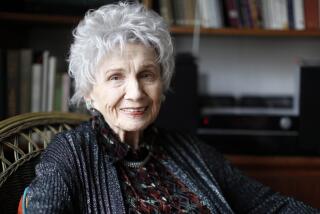Alice Munro: Nobel Prize-winner’s unlikely Kristen Wiig connection
Alice Munro, who won the Nobel Prize for literature Thursday, is seen as a titan of the short story, thanks to collections including “Dance of the Happy Shades” and “The Beggar Maid.”
She also has had an occasional—and recent--influence on film. Munro’s 2001 story “Hateship, Friendship, Courtship, Loveship, Marriage” was the basis of this year’s Toronto International Film Festival debut “Hateship Loveship,” acquired by IFC for a likely release next year.
The film features a personality one wouldn’t necessarily associate with Munro or the Nobel: Kristen Wiig, who marks her dramatic debut in the lo-fi indie.
PHOTOS: Celebrities by The Times
Adapted by Mark Jude Poirier and directed by Liza Johnson, “Hateship” follows Wiig’s Johanna, a housekeeper for an aging man (Nick Nolte) and his granddaughter (Hailee Steinfeld). Things take a turn for the quiet, slightly troubled protagonist when she begins corresponding with a person she believes is a male love interest (Guy Pearce) but turns out to be someone else, leading to serious if restrainedly expressed dramatic consequences.
The movie received solid reviews at the Toronto International Film Festival, with Variety calling it a “delicate and absorbing character study.”
The 82-year-old Munro, who lives several hours north of the festival in Ontario, was not able to attend the premiere. But in red-carpet interviews Wiig noted the Munro connection and said that acting in an adaptation of a Munro story was making use of “a different muscle, and I’ve always wanted to do it.”
PHOTOS: Fall movie sneaks 2013
It’s not the first time Munro’s work made the trip to the screen. Previously, her aging-themed “The Bear Came Over the Mountain” became the acclaimed 2006 Sarah Polley film “Away From Her,” which garnered screenplay and acting nominations at the Oscars the following year.
Nobel Prize literature winners tend not to be associated with many films. Harold Pinter, the 2005 laureate, is a rare exception, with his work often making it to the screen, as is 1998 winner Jose Saramago, who has seen novels such as “Blindness” and “The Double” adapted for film.
Gunter Grass, who won in 1999, is a Nobel laureate with one of the more famous filmic adaptations: his wartime coming-of-age novel “The Tin Drum” turned into the 1979 Volker Schlondorff movie that won the Palme d’Or and the Oscar for foreign-language film.
ALSO:Alice Munro wins Nobel Prize in literature
Toronto International Film Festival fresh start for directors, actorsAlice Munro, reviewed in the L.A. Times
Follow me on Twitter at https://twitter.com/ZeitchikLAT
More to Read
Only good movies
Get the Indie Focus newsletter, Mark Olsen's weekly guide to the world of cinema.
You may occasionally receive promotional content from the Los Angeles Times.











